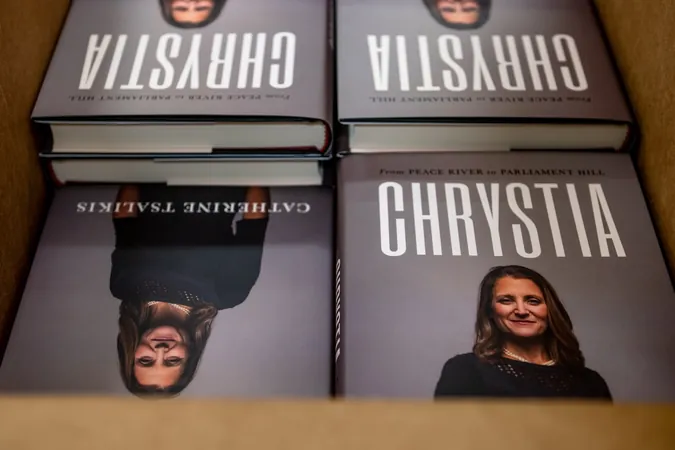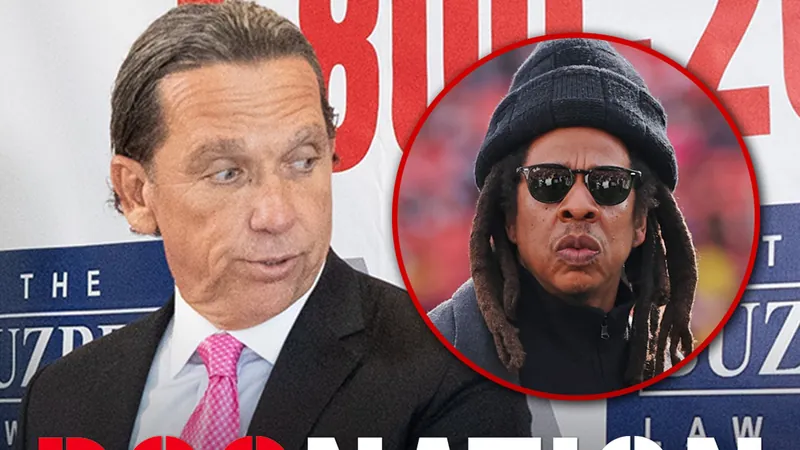
A Flattering Glimpse into Chrystia Freeland's Journey: From Small Town to Political Powerhouse
2024-12-19
Author: Charlotte
Overview
In a captivating and detailed biography titled *"Chrystia: From Peace River to Parliament Hill,"* Catherine Tsalikis offers readers an engaging look into the life of Canada’s former finance minister and deputy prime minister, Chrystia Freeland. Published by House of Anansi, this 360-page work paints an overwhelmingly positive portrait of a woman whose career has been both celebrated and scrutinized.
Author's Perspective
Tsalikis, a writer and journalist from Toronto, presents Freeland in a light that suggests she is not only a vital player in Canadian politics but potentially a future prime minister. The biography lacks critical analysis, which could raise eyebrows given the numerous controversies Freeland has experienced over the years. The choice to refer to Freeland simply as “Chrystia”—an indication of familiarity—further enhances the book's sympathetic tone.
Political Future
Despite the recent uncertainty surrounding Freeland's political future, particularly her recent resignation from cabinet, Tsalikis positions her as Prime Minister Justin Trudeau's most likely successor, attributing this belief to Freeland’s extensive accomplishments and tenacity.
Early Life
Freeland's life story is remarkable, beginning in Peace River, Alberta, where she was born to two passionate lawyers. Her mother fought for women's rights and retained her Ukrainian heritage, influences evident throughout Freeland’s personal and professional life. The separation of her parents at a young age and the subsequent back-and-forth travels between Peace River and Edmonton shaped her perspective, yet Tsalikis doesn't delve deeply into this aspect.
Educational Background
An exceptional student, Freeland attended Harvard University, where she famously declared that she would never serve as Canada’s foreign minister due to what she perceived as the country's insignificance. However, her career path took a sharp turn toward international relations after an exchange program in Ukraine, which saw her deeply involved in pro-democracy movements, attracting attention even from the Soviet press.
Journalistic Career
Freeland’s journalistic career skyrocketed quickly, encapsulated by her harrowing experience as a Financial Times stringer in Ukraine, where police brutality interrupted a meeting between dissidents. This tenacity and courage earned her the role of the FT's Moscow bureau chief and later editor positions at both the FT and The Globe and Mail. Although Tsalikis highlights Freeland’s dynamism in these roles, she also notes the mixed reactions from colleagues, suggesting a tumultuous managerial style.
Political Transition
Her transition from journalism to politics began serendipitously at a book launch in 2012, where Freeland impressed Trudeau, who encouraged her to run for office. By 2015, she was appointed Minister of International Trade, where her first significant success was salvaging a critical free trade deal with the European Union, showcasing her diplomatic skill.
Critique of Tenure
As foreign minister, Freeland had a mixed record; her response to the renegotiation of the North American Free Trade Agreement sparked debate, while her strong stance on human rights brought both international accolades and domestic controversy. Specifically, her tweet condemning human rights violations in Saudi Arabia strained relations, exemplifying the tightrope politicians often walk between foreign policy and diplomatic relations.
Recent Developments
Freeland ascended further in 2020 when she was appointed as deputy prime minister following the resignation of Bill Morneau during the COVID-19 crisis. Tsalikis portrays her leadership in establishing a national childcare program as a primary achievement, while glossing over a backdrop of economic challenges such as inflation and deficits impacting Canada.
Conclusion
As speculation swirls about her future, with the Liberal Party trailing significantly in polls, Tsalikis posits that Freeland could very well ascend as the next leader, if not prime minister, despite the current political climate. This biography provides an insightful look at a formidable woman in Canadian politics, but readers may find it lacks balance and critical reflection.
Overall, *"Chrystia: From Peace River to Parliament Hill"* is a rich narrative for those who admire Freeland but may leave skeptics yearning for a more nuanced examination. As she navigates this uncertain chapter in her political career, one can only wonder: is this a stepping stone to greater power, or a sign of challenges yet to come?









 Brasil (PT)
Brasil (PT)
 Canada (EN)
Canada (EN)
 Chile (ES)
Chile (ES)
 España (ES)
España (ES)
 France (FR)
France (FR)
 Hong Kong (EN)
Hong Kong (EN)
 Italia (IT)
Italia (IT)
 日本 (JA)
日本 (JA)
 Magyarország (HU)
Magyarország (HU)
 Norge (NO)
Norge (NO)
 Polska (PL)
Polska (PL)
 Schweiz (DE)
Schweiz (DE)
 Singapore (EN)
Singapore (EN)
 Sverige (SV)
Sverige (SV)
 Suomi (FI)
Suomi (FI)
 Türkiye (TR)
Türkiye (TR)